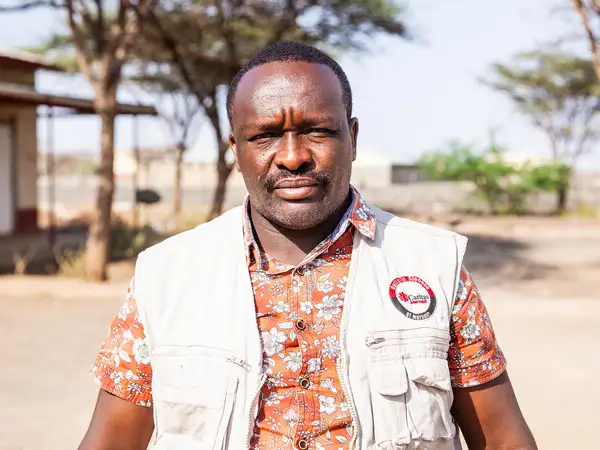Fix the food system
Catholics across England and Wales have sent messages urging the government to rethink our global food system.


Galgallo belongs to a community of pastoralists who, for generations, have supported themselves by looking after livestock.
In the face of drastically unpredictable weather patterns, many see education as offering a kind of security that pastoralism sadly no longer can.
“Before this drought, I had over 1000 goats, and about 100 camels. Out of that, I have just five camels left.”
Galgallo rests his hands on the empty rock enclosure that once held the bulk of his animals. Bante, the Emergency Response Manager for Caritas Marsabit, shakes his head.
Galgallo lives in the remote village of Tullu Dimtu, in northern Kenya. He belongs to a community of pastoralists who, for generations, have supported themselves by looking after livestock. He has spent his entire life – 74 years – caring for his herd. Now, their bones litter the surrounding area, killed off with frightening speed by the worst drought in 40 years.
“My last hope now is the education of the children,” he says. “My mind is entirely focused on my two girls. I really hope for them to succeed in education.”
Marsabit County, where Galgallo lives, is suffering some of the worst effects of the climate crisis. Four years of failed rains have left the land parched and barren. Drinking water is scarce and animals have died in their thousands, leaving pastoralist families struggling to get enough to eat. But even in the face of so many challenges, people in the area are keen to keep sending their children to school.
“I would rather keep paying my children’s school fees and stay hungry myself if I have to,” says 40-year-old Gonole, from neighbouring Warra village. “Growing up, I knew somebody of my age. When we went our separate ways, they went to school and I focused on livestock. That friend of mine now is not threatened with hunger and starvation like I am. I don't want that to happen to my children.”
In the face of drastically unpredictable weather patterns, many see education as offering a kind of security that pastoralism sadly no longer can.


Bante and his colleagues from Caritas Marsabit are continuing to support communities with food and water, as well as working with them on longer term projects like the installation of a water storage tank.
Galgallo gestures at Bante as an example.
“In one way I am related to Bante,” he says, “I knew his family back when he was very young. We used to move our livestock with his parents. And when he went to school and got opportunities to work with Caritas, we knew he was in a better position now to help.”
Like almost all of the humanitarian experts employed by Caritas Marsabit, Bante grew up in a pastoralist community much like Galgallo’s. He says he knew early on that he wanted to work helping people in his community.
“Being brought up in a pastoralist lifestyle, I saw what humanitarian organisations were doing in the community,” says Bante. “And I said: 'I need to go and study humanitarian work.' Ever since I completed my high school, I had an ambition of working for a humanitarian organisation.”
Bante dedicated himself to his education, achieving qualifications in Community Development and Social Work, and gaining vital expertise that helps him carry out his work. But, Galgallo tells me, his understanding of the concerns and interests of the people he works with is every bit as vital.
“Having somebody who knows you and knows your challenges working in a humanitarian organisation is absolutely very important,” continues Galgallo. “It will take less effort to make this person understand. We just mention and he already understands the deepest details of your situation. But for others, somebody would wonder, why are you even in that village? Why did you settle there in the first place? So it would be a big struggle. But for somebody that was born and brought up in that environment, it is easier for them to understand and appreciate. He understands our needs and knows better how to help than somebody who has not lived in this environment before.”
Bante and his colleagues from Caritas Marsabit are continuing to support Galgallo’s community with food and water, as well as working with them on longer term projects like the installation of a water storage tank. Donations to CAFOD have also helped fund school feeding programmes in the area, ensuring children at school get healthy meals and can continue to pursue their education.
As we prepare to leave, Galgallo once again gestures at Bante.
“One thing that I am grateful to God about is that we have sent some of our children to school and they have learned, they have developed networks, and they can link us from where we are to outside Kenya,” he says. “What is important in this world now is about network - about being connected. About your voice reaching out. This is one sure benefit of education that we have now seen.
“At last we can be heard."
Catholics across England and Wales have sent messages urging the government to rethink our global food system.
Pray with us for a fairer global food system where everyone has enough.